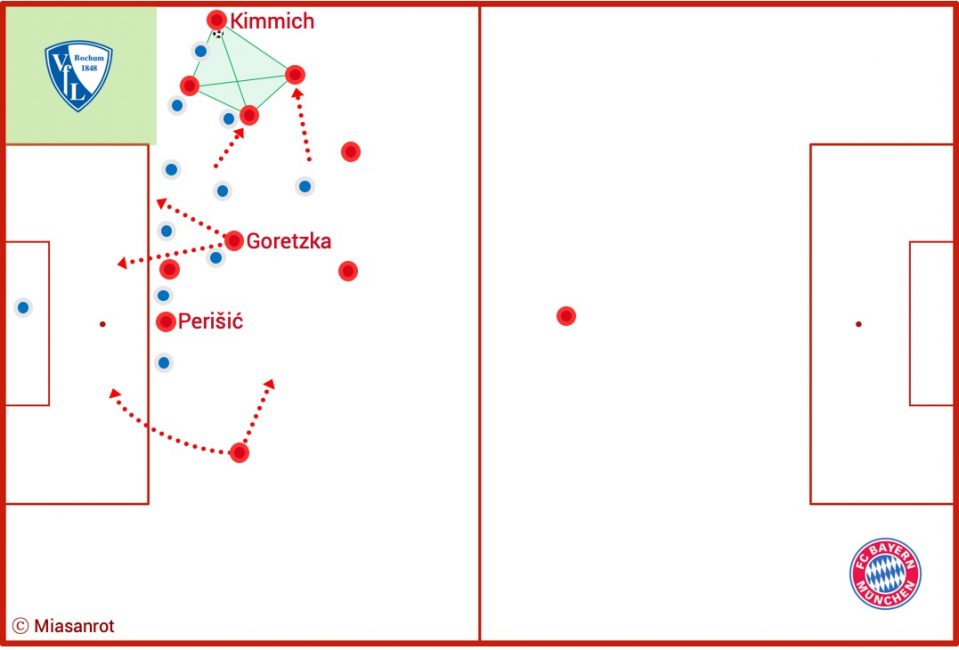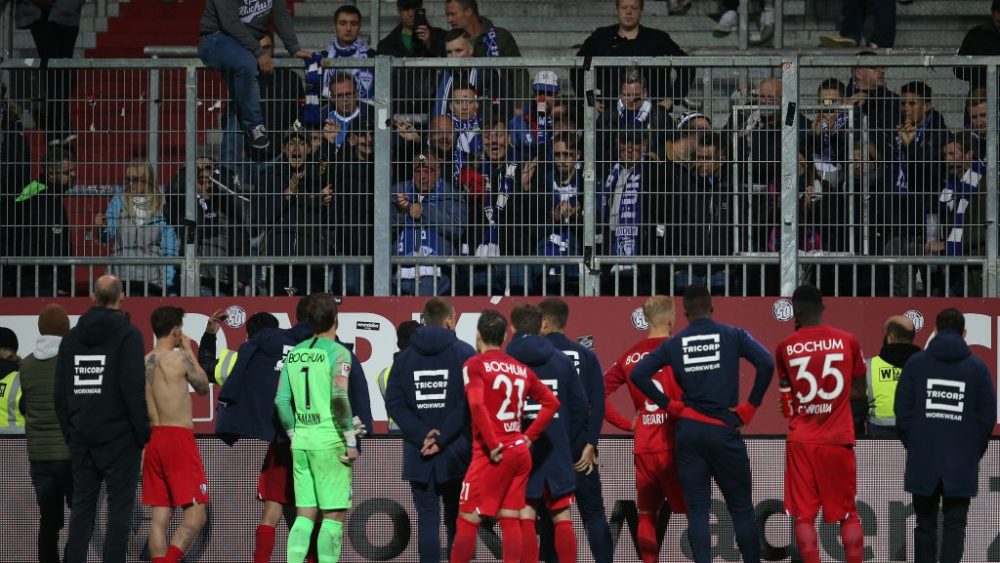Preview: DFB Pokal round 2 – VfL Bochum against FC Bayern
Against FC Union Berlin last weekend, Bayern took a long time before they found a way to break down Union’s defense. For long periods of the game, Union was stable at the back, kept their shape, and managed to keep Bayern’s offensive efforts at bay.
And so it turned out to be another one of these games we have had so many of lately where Bayern’s supporters had to worry about the outcome until the very end. This time, however, Bayern managed to carry the win over the line. The manner in which they did though left a lot to be desired once again.
The next game will be against Bochum on Tuesday evening. Bochum is a team that has been struggling mightily in the 2. Bundesliga this season. But as we all know, cup games are a different animal, as Bayern will be only too happy to tell you after their hard fought victories against Drochtersen/Assel and Rödinghausen last year.

Bochum: the inconspicuous “Ruhrpott” Club
Now Bochum intends to do one better. From 1971 to 1993, they were a member of the Bundesliga, where they got the nickname “Graue Maus” (a non-distinct, inconspicuous entity) because they were a permanent contender for a place in the middle third of the final table. A lot has changed since then.
From a perennial midfield contender, Bochum first turned into a yo-yo club scaling an impressive range of varying success from two participations in the UEFA Cup to five relegations to the 2. Bundesliga within 17 years. Since 2010, the club has been a permanent member of the 2. Bundesliga.
Meanwhile, Bochum seems to have rekindled their “Graue Maus” existence – only one tier further down this time. This season, however, their situation appears to be more threatening. They have won one, drawn six, and lost four of the season’s first eleven games. At 20-24 goals and 9 points, the club is ranked 16th in the table, three points behind Sandhausen in 15th place.
Bochum’s problems
If a club experiences a steady decline over decades, everything that happens on the pitch today can only ever serve to tell a small part of the story. From Bayern’s perspective, however, this part is the only one that matters.
Despite the recent coaching change from Robin Dutt to Thomas Reis, Bochum’s football has not changed a great deal. Bochum intends to build up from the back in possession, but also be prepared to hit their opponent with concerted gegenpressing in transition to create chances from second balls.
Their possession game is susceptible to pressure and their 4-2-3-1 based system does not provide them with the necessary structural means to consistently create dangerous chances. Instead, the system tends to provoke a disproportionate number of individual errors which have already led to a number of conceded goals. 27.3 turnovers and 98.2 misplaced passes per game on average is unsustainable in the long run.
Good pressing in theory, but…
There is not enough support for the player on the ball in build-up play. Hence, a lot of long balls over the top (69 per game) are the logical consequence of attacks that are fundamentally ill-conceived. By extension, Bochum is rarely able to conduct an effective gegenpressing because the players are too far away from their opponents before they lose the ball.
Hasty shots and chances whose quality is mostly below par are the symptoms of a game that generally lacks creativity across the board. Yet, there are a few bright spots too. Striker Silvère Ganvoula is in stellar form. In 900 minutes of game time, he has already scored eight goals and set up three. Due to his pace, he is capable of quickly closing down opponents and is a useful target for deep passes in behind the opponent’s defensive line. As a traditional box player, he also knows how to get to the end of a cross.
High crosses are one of Bochum’s favorite offensive tools anyway. They have had 42 shots on goal from crosses in eleven games this season (including ten corners and three free kicks). Moreover, their high work-rate and high-intensity playing style provide a huge boost to their defensive game because it enables them to win a lot of balls. 12.5 interceptions on average per game are a league high and 18.4 successful tackles put them third in this ranking. If Bochum is given enough time in defensive transition, they are quite able to get back into shape and be stable in defense. Their problem is that it often takes them too long to get sorted in transition. 24 goals against cannot all be exclusively down to deficiencies in possession.
Bayern: crossing Bochum out of the competition?
Speaking of deficiencies, Bayern’s performance against Union last Saturday was anything but convincing too. Veteran player Christian Gentner mentioned after the match that he had had much harder tests in Munich in his career before. Union’s summer signing was only the latest person in a long line of people who could not resist to take a jibe at Germany’s record champions.
There was Funkel’s statement about Bayern’s defensive stability (or lack thereof), Schreuder’s remark that Schalke had been his team’s strongest test of the season so far (one week after the game against Bayern), and Eberl’s prognostication that this season would be very complicated for Bayern – nobody seems to be able to look past the fact that Bayern has been struggling.
Bochum will certainly believe in their chances on Tuesday evening. If they work hard and stay compact in defense, they will get their opportunities. But they have to watch out for Bayern’s propensity for high crosses. This is probably the area in which Bayern has improved most under Niko Kovač. Only Frankfurt (27) and Leverkusen (23) have delivered more crosses so far this season.
Are Bayern’s strengths a good match for Bochum’s weaknesses?
What is usually seen as a sure sign of a dearth of creativity could become an asset against Bochum. Bochum can be hurt with high crosses, especially if there is a lot of activity in the penalty box and the player delivering the cross is not closed down quickly enough. Thomas Reis might try to cover up this problem by switching to a back three / back five.
Bayern might yet benefit from their crossing capability by bringing Kimmich into open space down the right flank. To do so, they could either use long switches of the play or overlapping runs by Kimmich that allow him to get behind the last defensive line. With Leon Goretzka, a player is set to return to the squad whose deep runs into the penalty area and qualities in the air would make him a worthwhile target for high crosses. Along with his Bochum background, where he spent his time as a youth player, this might make him an ideal candidate for Kovač’s starting eleven. Perišić could also be an option for the starting eleven on the left wing to gather up overhit crosses. He usually makes more structured movements towards the center than the more unpredictable Kingsley Coman.

Having said all that, Bayern should take care that their game does not end up as a festival of crosses coming from all areas of the pitch. A good crossing game needs to be properly initiated. Bayern has had troubles doing this recently. If Bochum should be the first team able to shut out Robert Lewandowski, we could be in for an interesting evening. He has scored 19 goals in 14 games this season. Only Gnabry comes anywhere close to this with six goals in 12 applications. No other Bayern player has scored more than three goals this season.
So Bayern’s quest for alternatives to relying on Lewandowski in attack will continue in the match against Bochum. Fortunately for Bayern, Bochum’s weaknesses seem to ideally suit their strengths. The game could be a perfect time to give a meaningful chance to young players like Lukas Mai, who is about to come back from an injury just in time for the match. Alphonso Davies could also get his second chance in a row. Both players have the requisite quality to compete in such a game and there is much less risk in using them than the names might suggest.









